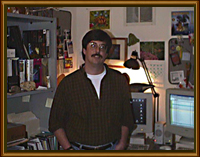An
Interview with Art Director Jon Bock
For a sneak peak behind the scenes of Quest for Glory V, we chased down Art Director John Bock to answer some of the questions people are asking about the new game.
Jon, tell us about an Art Director’s role in the production of a computer game like Quest for Glory V.
 My job is to
maintain a high level of quality in the art, animation, and special effects throughout the
game. I work with the game’s designer, technical director, and producer to create the
overall look and feel of the game, and direct the work of a very talented group of artists
and animators that create the characters, backgrounds, and movie scenes that make up the
game. The art team is using the best commercial 2D and 3D art tools in the computer
graphics industry, including Alias, Softimage, and 3D Studio MAX, as well as proprietary
graphics tools written by our in house programming team.
My job is to
maintain a high level of quality in the art, animation, and special effects throughout the
game. I work with the game’s designer, technical director, and producer to create the
overall look and feel of the game, and direct the work of a very talented group of artists
and animators that create the characters, backgrounds, and movie scenes that make up the
game. The art team is using the best commercial 2D and 3D art tools in the computer
graphics industry, including Alias, Softimage, and 3D Studio MAX, as well as proprietary
graphics tools written by our in house programming team.
Sounds like a lot of work.
With eight to ten artists working on the game at any one time over the last two years, creating the art for Dragon Fire has taken the art team almost 20 man years to create!
Dragon Fire combines two of my favorite things, beautiful 3D rendered background scenes and state of the art real time 3D characters. This combination allows us the flexibility of real time 3D characters and special effects, without the loss of detail that is unavoidable in fully real time 3D action games (like Quake.) Eventually fully real time environments may approach the level of detail of Dragon Fire’s rendered scenes, but for now there is no comparison.
Many early press reviews have mentioned the unique look and interface of Dragon Fire. What kind of engine is behind the game?
Quest for Glory V: Dragon Fire uses a unique graphics engine that combines 2D and 3D computer graphic techniques to create a highly detailed fantasy environment. In Dragon Fire, real time 3D characters and special effects are composited with panoramic rendered 2D backgrounds created in Alias Power Animator and 3D Studio Max. The rendered backgrounds use an 8 bit depth map, also called a z-buffer, to determine depth within the scene, and to allow characters to move inside the panorama in a realistic manner.
How does this engine compare with those used in other games?
Dragon Fire graphics engine is similar in many ways it’s predecessor, Sierra’s longstanding gaming system SCI. and their similarities give Dragon Fire the "Classic Sierra" adventure game look. Both systems combine animated characters with detailed graphic backgrounds, but the Dragon Fire Engine has surpassed SCI in it’s use of 16 bit graphics, and the integration of real time 3D art and animation.
One of the hot industry buzzwords is Realtime 3D. Does Dragon Fire use this technology?
Dragon Fire is the first game in the Quest for Glory series to use Real Time 3D computer graphics. In previous games, backgrounds were drawn and painted by hand, and animation was done with video capture, 2D computer animation, and detailed clay models to create characters and combat sequences. With real time 3D, characters are created as 3D polygon models, which can be displayed in the game from any angle. Animators then create a series of motion files that are linked together by the programming team to make characters walk, run, jump, and fight. Dragon Fire also uses real time effects like fire effects for lava and torches, and glow effects that help bring the scenes to life.